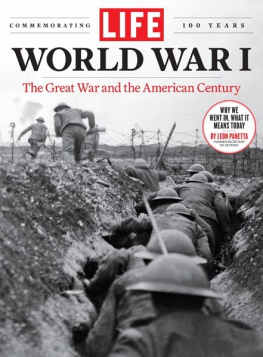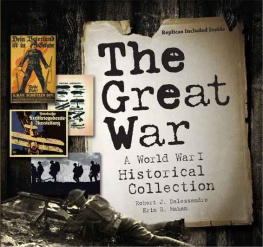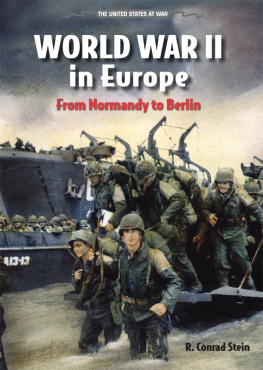THE WORLD WOULD NEVER BE THE SAME AGAIN
The assassination of Archduke Franz Ferdinand in 1914 ignited a bloody conflict among Europes most powerful nations. As leaders in Europe bullied each other toward war, they had no idea that this war would become a global conflict. The United States entered World War I and sided with the Allies in their fight against the Central Powers. Millions of people died during World War I; empires were destroyed, kings were dethroned, and countries disappeared from the map. Author Zachary Kent details the war to end all wars, including the doughboys of the United States, life on the home front, and the introduction of modern warfare.
About the Author
Zachary Kent has published many books of history and biography for young people, including Dolley Madison: The Enemy Cannot Frighten a Free People for Enslow Publishers, Inc.

Image Credit: National Archives and Records Administration
At a country auction in upstate New York many years ago, I bought a handsome pair of brass binoculars. They had belonged to a man named G. G. Volkmar. Etched on the brass were the words U.S. Navy. Included with the binoculars was a very interesting letter dated May 9, 1918:
Dear Sir:
Your prompt and patriotic response to the NAVYs call for binoculars is most appreciated. The glasses will be very useful in the prosecution of Naval Operations until victory is won. On behalf of the NAVY, I wish to thank you most heartily.
Very respectfully,
Franklin D. Roosevelt
Assistant Secretary of the Navy
In 1914, war erupted across Europe. The Allied nations of France, Great Britain, and Russia battled against the Central Powers of Germany, Austria-Hungary, and Turkey in what became known as the Great War. When the United States entered the fight on the side of the Allies in 1917, every loyal American citizen wished to pitch in. Mr. Volkmar gladly loaned his binoculars to Americas war effort.
When I look at that pair of binoculars now resting on my living-room table, I am reminded of that time. When World War I ended in 1918, 116,000 American soldiers had died of wounds and disease. These men represented only a small number among the millions who perished in World War I. It was a senseless war and a brutal war, more horrible than anyone could have imagined. When it joined the fight, the United States found a national pride that propelled it to international greatness. But in the process, America lost its sense of innocence.
1
THE SINKING OF THE LUSITANIA

NOTICE! TRAVELLERS INTENDING TO EMBARK ON
THE ATLANTIC VOYAGE ARE REMINDED THAT A
STATE OF WAR EXISTS BETWEEN GERMANY AND
HER ALLIES AND GREAT BRITAIN AND HER
ALLIES; THAT THE ZONE OF WAR INCLUDES THE
WATERS ADJACENT TO THE BRITISH ISLES.
From a warning printed in the New York Times by the Imperial German Embassy, May 1, 1915

A long, black German submarine lurked unseen beneath the oceans surface. Several miles off the southern coast of Ireland, Captain Walther Schwieger raised the periscope of U-boat 20. Peering through the eyepiece, he could hardly believe what he saw. Steaming along some seven hundred yards away was the great British passenger liner Lusitania. The Lusitania, the fastest ship on the Atlantic Ocean, weighed 31,550 tons and was 790 feet in length. In Germanys war against Great Britain, the sinking of such a target would be a tremendous victory. At just after two oclock on the afternoon of May 7, 1915, Schwieger ordered, Fire one! In the torpedo room, a sailor pulled a firing lever. A fierce hissing swept through the submarine as high-pressure air blasted the torpedo out of its tube.

Image Credit: Rue des Archives / The Granger Collection, New York
This advertisement from the New York Herald announced the sailing of the Lusitania from New York to Liverpool, England, on May 1, 1915. At the bottom of the ad, there is a notice about the danger of traveling on the Atlantic because of the war between Germany and England.
Aboard the Lusitania, passenger Oliver Bernard caught sight of something strange as he gazed out at the bright blue sea. What is that streak in the water? he wondered. Its spreading. Its coming closer. A ships lookout suddenly noticed the white wake and shouted, Torpedo coming on the starboard side! Within seconds, the torpedo crashed into the liners hull. The explosion sounded like a million-ton hammer hitting a giant steel drum, passenger Michael Byrne remembered. It is not clear whether the second explosion that quickly followed was caused by a cargo of ammunition stowed aboard the Lusitania or by an exploding boiler. The second explosion rocked the ship. On the starboard side, deck planks, lifeboats, coal dust, and water flew upward. In the dining saloon, fearful first-class passengers scattered away from their tables as the glass from shattered windows showered them. Elsewhere, the force of the blast knocked people to the floor. Flames and smoke poured into some staterooms and through corridors.
Aboard the German U-20, Captain Schwieger stared through his periscope. Shot hits starboard side right behind bridge, he noted in his log. A heavy detonation follows with a very strong explosion cloud.
Already, the Lusitania was tilting to starboard and settling deeper into the water. From below, the crew tumbled out onto the boat deck. Boat stations! Captain William Turner soon ordered. The crewmen prepared to lower the lifeboats. Alarmed passengers streamed up the stairways or wandered about in confusion. Passengers carrying babies and life jackets struggled to reach the deck. Many rushed upstairs shirtless or shoeless. Cursing and shrieking, the terrified crowd pressed up against the deck rails. Without engine power, the ship drifted. Tons of seawater poured in through open lower-deck portholes. Passengers trapped inside the ships electric elevator screamed for help as the water slowly rose about their feet.
Few passengers imagined that such a huge and grand ship as the Lusitania could be sunk quickly by one torpedo. Only minutes had passed since the torpedo had struck. Panicked passengers clung together in helpless masses along the starboard side of the deckhouse. Above them, the ships towering funnels leaned far to one side, and water crept rapidly along the deck from the now almost submerged bow. Passenger Belle Naish realized that [w]ere sinking fast. It cant be long now.
People scrambled wildly aboard lifeboats. Lower away! crewmen yelled. They tried to swing the boats over the rails. Some of the heavy lifeboats broke away, crushing people against the deck. Others dropped awkwardly, spilling their passengers into the water.



